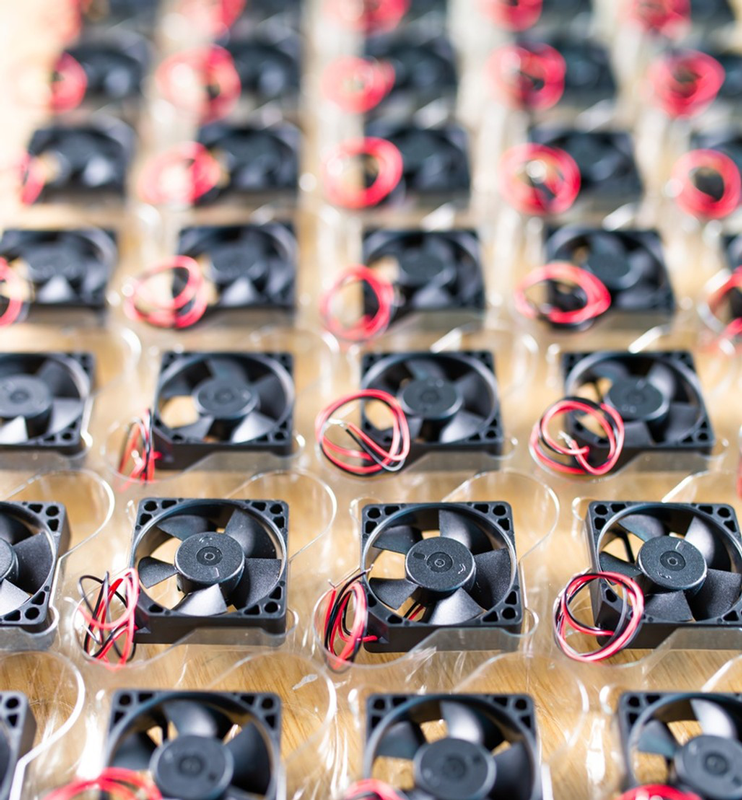In the DC cooling fan industry, buyers typically prefer working directly with original manufacturers capable of independent R&D and production. This approach ensures product quality, effective communication, and timely issue resolution. However, industries such as medical equipment, stage lighting, and laser devices often face difficulties finding manufacturers willing to take on small orders due to their limited purchase volumes. Why do DC fan manufacturers often reject small-quantity orders or require a minimum order quantity of at least 100 units? The reasons stem from critical production and operational factors.

The Conflict Between Production Efficiency and Cost
For DC cooling fan manufacturers, production processes are highly standardized and efficiency-driven. Small-batch orders pose several challenges:
High Setup and Material Changeover Costs
- Equipment Adjustment: Machines need to be calibrated before production to meet specifications, which takes around 10 minutes.
- Post-Production Cleanup: Clearing leftover materials after production also requires an additional 10 minutes.
For a 1,000-unit order, these costs are minimal when spread across all units. However, for a 100-unit order, setup and cleanup time form a significant portion of the total production time, reducing efficiency.
Drastically Reduced Production Efficiency
- A typical production line can output 1,000 cooling fans per hour. Producing only 100 units utilizes less than 10 minutes of machine time, leaving equipment idle for the remaining period. This underutilization drives up operational costs.
Sharp Increase in Per-Unit Costs
- In mass production, the unit cost of a cooling fan might be as low as ¥1. In small-batch production, due to lower efficiency and higher labor cost allocation, the per-unit cost could rise to ¥5 or more—over five times the original cost.
Complexity in Supply Chain Management
Beyond production, small-quantity orders introduce additional complications:
Material Procurement Costs
- Cooling fans often require customized components like motor windings, casings, and blades sourced from upstream suppliers. These suppliers generally impose minimum order quantities. Excess materials from a small order may remain unused, increasing inventory costs.
Unchanged Quality Control Costs
- Quality control procedures, including testing, are necessary for every batch, regardless of size. Testing costs remain fixed, making them disproportionately high when distributed across small-batch orders.
Inefficient Logistics and Delivery
- Small orders often require separate packaging and shipping, which incurs higher logistics costs compared to bulk shipments. Additionally, such orders consume more operational resources.
Solutions for Small-Batch Orders
Despite these challenges, manufacturers aim to provide flexible solutions to support customer needs:
Batch Consolidation
- Customers with small-quantity needs are encouraged to place cumulative orders covering three months' demand. This approach enables consolidated production, reducing setup and cleanup waste while improving efficiency.
Standardized Product Offerings
- For small-batch requirements, manufacturers can recommend existing standard models, eliminating the need for custom design and minimizing additional production costs.
Custom Order Negotiations
- When custom products are necessary, manufacturers include the additional costs of low-efficiency production in their quotes, ensuring transparency and feasibility for both parties.
Ruiapple Electric’s Collaboration Advantages
As a cooling fan manufacturer with 24 years of industry experience, Ruiapple Electric understands the importance of meeting customer demands and quality expectations. We adhere to the following principles:
Efficient Production and Rigorous Quality Control
- With a monthly production capacity exceeding 2 million units, Ruiapple Electric maintains ISO9001 and IATF16949 certifications, ensuring consistent product performance and reliability.
Flexible Customization Services
- Our professional R&D team and advanced equipment enable tailored solutions to meet specific customer requirements, achieving the optimal balance between functionality and cost.
Customer-Centric Approach
- We prioritize customer needs, ensuring clear communication and sample verification before production to minimize errors and waste.
The production of cooling fans is characterized by high standardization and scalability. Extremely small orders reduce production efficiency and significantly increase per-unit costs. To better serve our clients, Ruiapple Electric optimizes production processes, offers tailored solutions, and assists customers in creating reasonable procurement plans, ensuring smooth and efficient collaboration. If you have any questions or procurement needs, feel free to contact us—we are committed to providing you with high-quality products and services!






